PhD Dissertation by Asma Mansoor
Thesis by Asma Mansoor
Papers by Asma Mansoor

International Journal of Leadership in Education, 2024
Positioning itself against the assumption that Pakistani women are repressed in the country’s mal... more Positioning itself against the assumption that Pakistani women are repressed in the country’s male-dominated academic spaces, our study flags the strategic deployment of erotic capital by some women academics for career advancement. It reveals the hitherto unexplored involutions of gender and sexuality in Pakistan’s higher education sector, examining how certain women navigate social sensitivities and double standards to leverage self-sexualization as a means of professional survival amidst masculine power structures. While acknowledging the objectification of women academics, this paper challenges the perception of them solely as victims of sexual abuse and reveals how they use their understanding of gendered dynamics to secure promotions and power. Drawing on qualitative data, our study uncovers how such practices undermine merit-based growth and further disadvantage women already marginalized in Pakistan’s patriarchal academic canvas. By tactfully deploying erotic capital, these individuals create a self-serving path to success, potentially eroding collective progress for women academics. Without aiming to stoke controversy or stereotype women negatively, ths paper breaks the silence on injustices arising from erotic politics in academia. It calls for protective measures to address inequities caused by manipulative practices, advocating for a more equitable and merit-based environment in Pakistan’s higher education sector.

International Journal of Leadership in Education, 2024
This article problematizes informal mentoring as a feminist praxis in Pakistani academia, highlig... more This article problematizes informal mentoring as a feminist praxis in Pakistani academia, highlighting the potential for exploitative control by some women academic leaders. We contend that informal mentoring is susceptible to misuse at the hands of self-serving Queen Bee academics to reinforce their influence over their women colleagues which can entail suppressing them. This challenges the notion that mentoring can be used as an empowering feminist praxis. Through a self-designed questionnaire administered to academic leaders in 55 universities in Pakistan’s Khyber Pakhtunkhwa and Punjab provinces, followed by focused group discussions with early, mid-career and senior academics, we expose contradictions between the benign self-perceptions of women academic leaders and the experiences of their coworkers. These contradictions reveal an absence of genuine empathy and support extended by women academic leaders and detrimental internal hierarchies among women, thus hindering the collective growth of women. This study also exposes abusive forms of exploitation of early and mid-career academics by their women line managers to stifle competition and sustain disempowering asymmetries. To combat these issues, we propose collaborative mentoring built on equal respect and freedom to dissent ensured through well-regulated mentoring programs overseen by Pakistan’s Higher Education Commission to preempt abuse within mentor–mentee relationships.

Worldviews: Global Religions, Culture, and Ecology, 2024
Taking its cue from the Islamic Ecological Paradigm, deeply rooted in Islamic religious tradition... more Taking its cue from the Islamic Ecological Paradigm, deeply rooted in Islamic religious traditions, which emerged more than 1400 years ago, this paper reimagines the human-nonhuman relationship against the backdrop of the arguably assumed superiority of mankind in (Islamic) theological discourses. Using Qurʾānic narratives as a key point of divergence in the natural superiority of man within the idea of vicegerency, we argue that the Qurʾān’s egalitarian ethos presents animals as ‘intentional political agents’ (Pepper 2021: 30) independent of human intercession. This agency enables them to be key players in deciding the outcomes of political conundrums; in so doing, it also rebuts and destabilises arrogant anthropocentric presuppositions associated with the idea of vicegerency. We particularly read, in ‘signs themed’ Qurʾānic narratives, a dynamic relationship between humans and animals through the animal’s role as Allah’s warriors and agents against human oppressors and transgressors. Drawing on the Islamic Ecological Paradigm, Angie Pepper’s idea of intentional political agency and Sarra Tlili’s de-anthropocentric reading of the Qurʾān, we suggest that the Qurʾān robustly invites humans to reflect on the animal world by foregrounding animals as political agents while epitomising human accountability and responsibility towards them instead of establishing a relationship of dominance.

Journal of Critical inquiry, 2023
Our paper investigates the fictional representations of 'biotechnological othering' and biologica... more Our paper investigates the fictional representations of 'biotechnological othering' and biological precarity as experienced by underprivileged Indian women with particular emphasis on the commodification of their wombs. Foregrounding the exploitation of their reproductive rights via surrogacy at the hands of the glocal capitalist elite, we rout our argument through the representational practices of The House of Hidden Mothers by Meera Syal and Origins of Love by Kishwar Desai to explore the disavowal of the reproductive rights of socioeconomically vulnerable Indian women and the re-perpetuation of capitalist modes of inferiorization that target them. Contesting the egalitarian tilt of posthuman discourses, our main contention is that the biotechnological commodification of the wombs of indigent women does not merely confine them within structural inequalities, it also ensures that they remain confined within a biological precarity. Taking theoretical support from pertinent voices in the field including Deepika Bahri, Laura Harrison, Anureet Lotay, Kateřina Kolářová and Eva-Sabine Zehelein, we unpick the multi-dimensional ramifications of biotechnological othering depicted in these novels to foreground the threat of biological precarity embedded within transnational surrogacy and the continuation of the dehumanization of Women of Color in today's world.
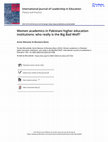
International Journal of Leadership in Education, 2022
In this paper, we investigate the under-examined relationships between Pakistani women academic l... more In this paper, we investigate the under-examined relationships between Pakistani women academic leaders and their female counterparts without leadership roles. We delve into the controversial assumptions that Pakistani women academic leaders enact patriarchal feminism that involves replicating masculinist practices of exclusion and thereby become a substitute Big Bad Wolf for their women coworkers. Data were collected via a questionnaire titled ‘Women in Leadership Positions in Pakistani Academia’ which was disseminated among women academics in 18 Pakistani higher educational institutions. This data was used to disentangle the contradictions in women academics’ attitudes toward their female b School of IT, Faculty of SEBE, colleagues in leadership positions and vice versa as well as the challenges framing their working relationships. We then postulate Luce Irigaray’s idea of the all-inclusive ‘female whole’ as a counterfoil to patriarchal feminism and to frame a feminine model of leadership that embraces the maternal instinct because it does not entail a weakening of women academic leaders nor a disregard for discipline and authority.
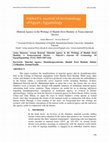
PalArch's Journal of Archaeology of Egypt/Egyptology, 2020
This paper examines the manifestations of material agency and its disanthropocentric hues in the ... more This paper examines the manifestations of material agency and its disanthropocentric hues in the writings of Pakistani anglophone writer Shadab Zeest Hashmi. While many other writers and thinkers in the Islamic world have produced works that articulate the embeddedness of the human within a semiotically active material world, including IbneSina, Al-Razi, Mahmoud Darwish and Dr. Muhammad Iqbal, to name but a few, the reason why we chose Hashmi’s texts is because they abound with palpable instances of nonhuman material agency articulating itself across centuries. These instances are useful for us in drawing inferences regarding disanthropocentric conceptions of nonhuman agency, as evinced in Islamic epistemologies. Taking cue from the theories of material agency by Karen Barad, Jeffrey Jerome Cohen and Timo Maran, we argue the ways in which Hashmi’s works operate as textual fossils since they incorporate the stories of the material world in conjunction with those of the human world. Through a close reading of her texts, we foreground how her writings are textured with the Islamic conceptions of the natural world, its material agency and the narratives this agency yields in conjunction with the human.
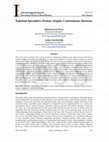
International Review of Social Sciences, 2021
This survey paper examines the evolving trends in contemporary Pakistani speculative fiction whic... more This survey paper examines the evolving trends in contemporary Pakistani speculative fiction which brings together tropes and motifs from imaginative worlds of local folklores as well as Islamic mythical worlds of South Asian civilization. We particularly discuss the ways in which, by adapting extra-terrestrial life forms, mythological tropes and themes from the Urdu popular genre tradition, Pakistani anglophone writers bring to the fore the greater potential of the speculative genre in responding to more contemporary problems associated with patriarchy, fundamentalism, gender issues, neo-colonialism, marginalization, racism, war technology and anxieties associated with emergent forms of nationalism. This paper specifically engages with Pakistani anglophone speculative fiction which is explicitly in conversation with Urdu science fiction and fantasy tradition, and in so doing these works create new worlds of indigenous cultures as vibrant and resistant yet firmly fixed in both myth and alternate futures. Our survey of a long-standing fascination of Pakistani anglophone writers with some local tropes that refigure in their speculative fiction shows how these non-western speculative paradigms can serve to re-centre and revive Pakistani speculative tradition in the global popular culture.

Compare:A Journal of Comparative and International Education, 2020
We propose a decolonial-posthuman pedagogy for contemplating
the idea of ‘womanness’ in postcolon... more We propose a decolonial-posthuman pedagogy for contemplating
the idea of ‘womanness’ in postcolonial Pakistan. Since posthumanism
disbands anthropocentrism while decoloniality subverts
Westcentrisms, we combine them to upend the notions of passivity
and muteness attributed to Pakistani women via western feminist
discourses. By foregrounding ‘womanness’ as an ongoing process
of self-construction, we enable our undergraduate female Pakistani
students of English Literature to rethink their selves as agentic
knowing subjects. Through carefully designed activities, our students
combined specific decolonial and posthuman theoretics
while reading Frankenstein as a site wherein their own experiences
as Pakistani women could be brought into play. Our approach
blended the ideas of Walter Mignolo, Gayatri Spivak and Rosi
Braidotti, etc., to posit how Pakistani womanness involves inhabiting
other skins so as to raise questions regarding the modes of
repression that have historically gone into defining their sense of
self.
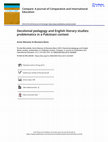
Compare: A Journal of Comparative and International Education , 2019
We propose a decolonial pedagogy in the teaching of English Literature at the undergraduate level... more We propose a decolonial pedagogy in the teaching of English Literature at the undergraduate level in postcolonial Pakistan. We argue that the English literary texts that are taught in conjunction with different supplementary materials retain a West-centric tilt that requires disbanding. Therefore, we administered carefully designed worksheets. These encouraged marginal thinking across the differential socio-historical canvases that outline the prescribed texts, online lectures, supplementary reading materials and the students’ situatedness. The students used these resources as tools for practising a decolonial hermeneutics. By directing these tools towards their own lived situation, they intervened within the Western means of knowledge production and undid their alterity and historical silencing. By analysing the students’ assignments as sites of decolonial articulation, we propose that decolonial pedagogy can be used to generate an intercultural intellectual solidarity that allows the formerly colonised to rethink themselves in a manner that no longer talks back to the Empire.
Critique: Studies in Contemporary Fiction, 2019
This article challenges Spivak’s critique of French feminism by presenting the latter as a tool t... more This article challenges Spivak’s critique of French feminism by presenting the latter as a tool to theorize the diverse subjectivities of third world women through their operation in an intimate “ecto-patriarchal” space. Using Arundhati Roy’s novel The God of Small Things and Ismat Chughtai’s Urdu short story “Lihaaf,” I indicate their alignment with French feminism as they depict third world women gaining autonomy over their selves and thereby exceeding ethnocentric boundaries without negating their contextual specifications. I mainly argue that French feminism enables third world women to rethink their subjectivities by exceeding self-replicating patriarchal discourses that have historically silenced them through a symbolic clitoridectomy.

Journal of Contemporary Poetics , 2018
My article investigates the decolonizing potential of disanthropocentrism in Paolo Bacigalupi’s n... more My article investigates the decolonizing potential of disanthropocentrism in Paolo Bacigalupi’s novel The Windup Girl. It foregrounds the idea that the anthropocentric violence entails the alienating and silencing the nonhuman, an act with which many literary texts have also been complicit. Utilizing ideas provided by Donna Haraway, Walter Mignolo, Bruno Latour and Karen Barad, etc., my paper deconstructs the concept of the anthropos by focalizing the re-‘configurations’ of the material syntax of the world and their semiotic potential. In challenging the essentialized notion of the anthropos, I have argued that the semiotic agentic materiality of nonhuman phenomena does not only resist biocolonialism, it also re-thinks the human and nonhuman as storied bodies that illustrate a non-hierarchical being-in-the-world in terms of material existence. In this context, my reading of Paolo Bacigalupi’s novel The Windup Girl presents the decolonizing potential of the material-semiotic agency of nonhuman matter, as it re-‘configures’ the idea of the ‘human’ in a manner that does not reinstall anthropocentric exclusivity and initiates a reorientation of the praxis of living wherein humans and the nonhumans collectively formulate a non-hierarchical communal aggregate
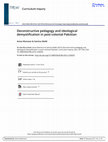
Deconstructive pedagogy and ideological demystification in post-colonial Pakistan, Oct 12, 2016
With post-colonial Pakistan inheriting the British colonial ideological
and governmental apparatu... more With post-colonial Pakistan inheriting the British colonial ideological
and governmental apparatus, the English literature curriculum
implemented at the university level in Pakistan carried the
interpellatory baggage of its colonial past. Our interdisciplinary
exploration focuses on using deconstructive pedagogy to demystify
and subvert the ideological conditioning of Pakistani students that
is done through the English literary syllabi taught at the Masters
level in Pakistani universities. These pedagogical practices involve
genealogical and deconstructive readings of selected English
literary texts taught to students pursuing a Master of English degree
at the International Islamic University, Islamabad. These practices
involve an activation of deconstructive readings through class
discussions to unveil the different hegemonic processes involved in
the constitution of docile political subjects. They challenge any
authoritative interpretation of canonical texts, creating new
meanings by activating the play of trace and differ�ence in the rereadings
of these texts within post-colonial Pakistan. The class
discussions have been transcribed to show how the English literary
texts introduced in the colonial era have been extracted out of a
Western epistemological closure. In addition, their role in the
constitution of colonial and post-colonial subjectivities has been
discussed. These discussions raise questions regarding the opaque
processes of self-constitution, yet do not aim at re-interpellating the
students. They simply revisit the closure within which the students’
thoughts and subjectivities are confined, and open up the
progression of thought processes so that the functionality of
different viewpoints within different communities may be
constantly re-visited to defy ideological colonization.

This paper explores the notions of " articulation, " " agency " and " embodiment " in Urdu poetry... more This paper explores the notions of " articulation, " " agency " and " embodiment " in Urdu poetry composed by Pakistani women. Although these terms have been taken from the First world feminist discourses, we aim to highlight how these three terms were not merely reflected in the contemporary poetry of Pakistani women, but rather were used to express their own modalities and associations as they countered the patriarchal system within which they were embedded. Our study does not simply apply these terms on selected poems by Kishwar Naheed (1940-), Fehmeeda Riaz (1946-) and Azra Abbas (1948-), but it also explores how these terms undergo a discursive diffraction as the Pakistani woman is no longer seen as a subaltern entity with a silenced subjectivity. We have taken on board the synonymic idea of writing as an agentive act of embodiment, as theorised by Luce Irigaray and Hélène Cixous. This is to show that while these terms were theorised by Western feminists, contemporary Pakistani women writers have, over the last few decades, been enacting these terms in ways which deny the stereotypical projection of the Third world woman in the Western gender discourses. For these women writers, writing enacts embodiment through articulation and thus agentively counters the objectifying gaze of the patriarchal order.
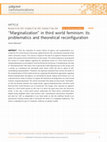
With the imposition of certain notions of agency and marginalization prescribed by first world fe... more With the imposition of certain notions of agency and marginalization prescribed by first world feminist discourses, global feminism has cumulatively remained mired within a binaristic closure. This closure is based on the idea of an agentive Western feminist center and a passive third world feminism at the margin. This article endeavours to go beyond this closure to initiate debates regarding the operational praxis of a third world woman's marginal placement as articulated in third world feminist discourses. It problematizes the idea of "disempowerment" that stems from a patriarchal model depicting man as the nucleus and a woman as a peripheral and centripetal entity, drawn within the mise en abyme of selfconsolidating representations. Therefore, the argument presented here revisits the notion of the marginalization of third world women by subjecting the theoretical approaches regarding female marginalization and agency-as articulated by Spivak, Irigaray and Kristeva, et al.-to a deconstructive mode of analysis to explore the theoretical reconfiguration of a third world woman's marginal placement. This article reconsiders the margin as discursively "limitrophic" so that the binaries between the margin/center, agency/disempowerment and third world feminism/first world feminism are re-scrutinized. The margin, thus, becomes an agentive plane for a third world woman as she uses it to direct her gaze away from any discursive center. In this way, a third world woman undermines the West-centric centripetal force despite being englobed within what Kristeva calls "supranational sociocultural ensembles" and sees her "self" as independent of any fixed center so that she redefines herself as an autonomous thinking woman able to dismantle the notion of a congealed subalternity. This article is published as part of a thematic collection on gender studies.

A close reading of Ralph Ellison’s Invisible Man reveals it to be standing at the cusp of many co... more A close reading of Ralph Ellison’s Invisible Man reveals it to be standing at the cusp of many conflicting notions all subsumed within the notion of invisibility. ‘Invisibility’ becomes a plane where all binaries do not only tend to be subverted, but lead to a disparate variety of ideas. While race does not seem to be confined to a clearly defined white/black binary, other binaries that contour the traditional ways of approaching the race issue end up being questioned as well. Subjectivity/ objectivity, blindness/sight, communalism/selfhood, etc, all are questioned as the nameless protagonist gains greater internal visibility while he paradoxically becomes invisible in the complex societal network of converging and diverging political interests. This fluctuation in the binary structures of the novel leads one to question the notion of invisibility on which the text is based and to further peel off the layers of meanings that the deconstructive tendency of the text tends to create. This study investigates the text’s questioning of hierarchal binaries which enables it to transcend the African-American experience and become a text for universal humanity. In becoming invisible, the narrator of Ralph Ellison’s Invisible Man tends to gain a new plane from where he can reconstruct his identity. However, in failing to reconstruct and recontextualise his self, he launches into a mode of resistance by dismantling monological structures, embracing collective humanity and forging an identity that transcends the barriers of race. In doing so, this study proves that he becomes a representative of common humanity.
As a Lecturer in the Department of English at the International Islamic University, Islamabad, I ... more As a Lecturer in the Department of English at the International Islamic University, Islamabad, I have, over the last five years, had exposure to reading as well as teaching both English Literature and World Literatures in English to undergraduate students of English literature. This has enabled me to appreciate the inter-connections amongst different forms of literature,an appreciation that has further been strengthened by my own endeavours to compose poetry in English. Pakistani Literature in English, being a burgeoning field, has offered me an interesting dimension of research because of the plurality of patterns that it offers.
"Teaching Creative Writing to second language learners demands a more enterprising approach from ... more "Teaching Creative Writing to second language learners demands a more enterprising approach from the teachers, since in such an environment, there are various literary, social, cultural as well as historical stimuli (both local and foreign) that can be engaged creatively in a creative writing classroom. Owing to the vast range of its meanings, Ekphrasis, in this context can serve as a means of integrating texts and mixed media in ESL Creative Writing practices.
However, my study does not merely stop at engaging ekphrasis in an ESL Creative Writing class, it also brings within its ambit the impact of the native culture of the ESL writers. This study, therefore, presents activities that incorporate ekphrasis and subsequently analyses the various nativization patterns that are engendered in the compositions of the ESL creative writers.
"

Uploads
PhD Dissertation by Asma Mansoor
Thesis by Asma Mansoor
Papers by Asma Mansoor
the idea of ‘womanness’ in postcolonial Pakistan. Since posthumanism
disbands anthropocentrism while decoloniality subverts
Westcentrisms, we combine them to upend the notions of passivity
and muteness attributed to Pakistani women via western feminist
discourses. By foregrounding ‘womanness’ as an ongoing process
of self-construction, we enable our undergraduate female Pakistani
students of English Literature to rethink their selves as agentic
knowing subjects. Through carefully designed activities, our students
combined specific decolonial and posthuman theoretics
while reading Frankenstein as a site wherein their own experiences
as Pakistani women could be brought into play. Our approach
blended the ideas of Walter Mignolo, Gayatri Spivak and Rosi
Braidotti, etc., to posit how Pakistani womanness involves inhabiting
other skins so as to raise questions regarding the modes of
repression that have historically gone into defining their sense of
self.
and governmental apparatus, the English literature curriculum
implemented at the university level in Pakistan carried the
interpellatory baggage of its colonial past. Our interdisciplinary
exploration focuses on using deconstructive pedagogy to demystify
and subvert the ideological conditioning of Pakistani students that
is done through the English literary syllabi taught at the Masters
level in Pakistani universities. These pedagogical practices involve
genealogical and deconstructive readings of selected English
literary texts taught to students pursuing a Master of English degree
at the International Islamic University, Islamabad. These practices
involve an activation of deconstructive readings through class
discussions to unveil the different hegemonic processes involved in
the constitution of docile political subjects. They challenge any
authoritative interpretation of canonical texts, creating new
meanings by activating the play of trace and differ�ence in the rereadings
of these texts within post-colonial Pakistan. The class
discussions have been transcribed to show how the English literary
texts introduced in the colonial era have been extracted out of a
Western epistemological closure. In addition, their role in the
constitution of colonial and post-colonial subjectivities has been
discussed. These discussions raise questions regarding the opaque
processes of self-constitution, yet do not aim at re-interpellating the
students. They simply revisit the closure within which the students’
thoughts and subjectivities are confined, and open up the
progression of thought processes so that the functionality of
different viewpoints within different communities may be
constantly re-visited to defy ideological colonization.
However, my study does not merely stop at engaging ekphrasis in an ESL Creative Writing class, it also brings within its ambit the impact of the native culture of the ESL writers. This study, therefore, presents activities that incorporate ekphrasis and subsequently analyses the various nativization patterns that are engendered in the compositions of the ESL creative writers.
"
the idea of ‘womanness’ in postcolonial Pakistan. Since posthumanism
disbands anthropocentrism while decoloniality subverts
Westcentrisms, we combine them to upend the notions of passivity
and muteness attributed to Pakistani women via western feminist
discourses. By foregrounding ‘womanness’ as an ongoing process
of self-construction, we enable our undergraduate female Pakistani
students of English Literature to rethink their selves as agentic
knowing subjects. Through carefully designed activities, our students
combined specific decolonial and posthuman theoretics
while reading Frankenstein as a site wherein their own experiences
as Pakistani women could be brought into play. Our approach
blended the ideas of Walter Mignolo, Gayatri Spivak and Rosi
Braidotti, etc., to posit how Pakistani womanness involves inhabiting
other skins so as to raise questions regarding the modes of
repression that have historically gone into defining their sense of
self.
and governmental apparatus, the English literature curriculum
implemented at the university level in Pakistan carried the
interpellatory baggage of its colonial past. Our interdisciplinary
exploration focuses on using deconstructive pedagogy to demystify
and subvert the ideological conditioning of Pakistani students that
is done through the English literary syllabi taught at the Masters
level in Pakistani universities. These pedagogical practices involve
genealogical and deconstructive readings of selected English
literary texts taught to students pursuing a Master of English degree
at the International Islamic University, Islamabad. These practices
involve an activation of deconstructive readings through class
discussions to unveil the different hegemonic processes involved in
the constitution of docile political subjects. They challenge any
authoritative interpretation of canonical texts, creating new
meanings by activating the play of trace and differ�ence in the rereadings
of these texts within post-colonial Pakistan. The class
discussions have been transcribed to show how the English literary
texts introduced in the colonial era have been extracted out of a
Western epistemological closure. In addition, their role in the
constitution of colonial and post-colonial subjectivities has been
discussed. These discussions raise questions regarding the opaque
processes of self-constitution, yet do not aim at re-interpellating the
students. They simply revisit the closure within which the students’
thoughts and subjectivities are confined, and open up the
progression of thought processes so that the functionality of
different viewpoints within different communities may be
constantly re-visited to defy ideological colonization.
However, my study does not merely stop at engaging ekphrasis in an ESL Creative Writing class, it also brings within its ambit the impact of the native culture of the ESL writers. This study, therefore, presents activities that incorporate ekphrasis and subsequently analyses the various nativization patterns that are engendered in the compositions of the ESL creative writers.
"
The sample of the study included fifty prospective teachers enrolled in the two years' M.A Education program at International Islamic University Islamabad, Pakistan for the session of 2009-2011. The data was collected through a self-developed questionnaire consisting of 24 items. It was divided into two major parts. The first part consisted of 12 statements related to Intrinsic Motivation and the second part consisted of 12 statements related to Extrinsic Motivation. It was a longitudinal study. The prospective teachers filled the same questionnaire four times at the end of each semester. The findings of the study revealed that there was a visible increasing trend in the Intrinsic and Extrinsic motivation level of the prospective teachers during their two years pre-service training session (from semester I-IV). Intrinsic motivation was observed under a variety of variables. These include admiration, security, the inspiration to opt for the profession, willingness for social service, and the love to share knowledge with others; an internal spirit to increase knowledge and a feeling for the profession as the most viable means of self expression. The findings of this exploration revealed an increase was observed in the intrinsic motivation of the prospective teachers within the two years of pre-service training session. In the second part of the study, extrinsic motivation was also observed and recorded on the basis of variables. These variables included external motives in opting for the profession, social status and economic status. The findings of the study showed a most pronounced increase in the extrinsic motivation of the prospective teachers within their two years of pre-service training session.
problematized are that which convention of marriage, i.e. of the East or of the West, is a better option, if marriage happens to be an end in itself and that who are the real audience of Monica Ali’s Brick Lane. In order to address these problem areas, this article presents the different approaches to marriage in various cultures across the world and why marriage has been labelled as a ‘social institution’ all over. While maintaining its focus on Brick Lane, this study proceeds to present an analysis of the pressures a family, particularly a married couple, experiences in an alien society. The problems faced by diasporic Bangladeshi brides and the impact of Western libertarianism has also been analysed. However, since the novel deals with the immigrant experience, an over view of the problems in marriage in Bangladesh itself has also been brought within the ambit of this article. Sociohistorical notions pertaining to marriage and the diasporic experience have been utilized to create the theoretical framework of this study, while textual evidence from Brick Lane has been brought in to supplement the analysis.
"